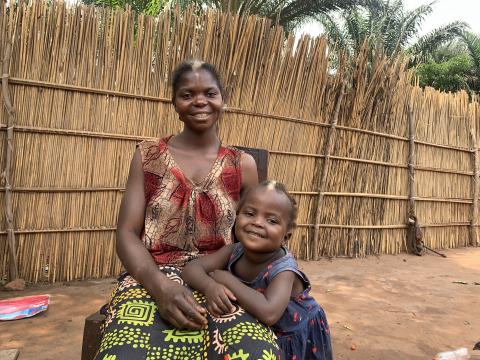DR Congo: The KOICA Project Restores Life to Scola and Transforms Families in Luiza

Luiza: A Rural Community Facing the Challenges of Malnutrition
Located in the Kasaï Central province, the territory of Luiza faces major public health challenges, particularly child malnutrition. In this rural area, access to healthcare is limited, infrastructure is poor, and families mainly depend on subsistence farming. Children, especially those under five, are the most vulnerable to acute malnutrition, often caused by unbalanced diets, poverty, and lack of nutritional awareness.
It is in this context that the project to fight malnutrition, implemented by World Vision with the support of the World Food Programme and funding from KOICA, is working to improve children’s nutrition and strengthen families’ resilience through a multisectoral approach.
Aimée and Scola: A Story of Resilience and Transformation
Aimée, a young mother living in Luiza, saw her dream of motherhood turn into a nightmare when her eldest daughter, Scola, began showing worrying signs: loss of appetite, physical weakness, and lethargy. Unaware of the symptoms, she thought it was just childish behaviour.
“Everything was fine until I noticed that my daughter’s body was getting weaker. She hardly had any appetite, and everything became confusing for me at that moment,” she recalls.
A visit to the local health centre revealed a shocking diagnosis: Scola was suffering from moderate acute malnutrition. Aimée, distraught, feared not only for her daughter’s health but also for the judgement of her family.
“When they told me my daughter was malnourished, I trembled. I didn’t know how to explain it to my family and my in-laws,” she confides.
Integrated Care Through the KOICA Project
Thanks to the KOICA project, Scola immediately received nutritional treatment. She was given Plumpy’Nut, a ready-to-use therapeutic food rich in energy, protein, and essential micronutrients. But the support did not stop there.
Aimée was included in the household food security programme, receiving improved seeds (amaranth, cabbage, aubergine, tomatoes) and practical training on how to prepare enriched porridge using local products.
“They showed us how to make porridge with the food we already have. I realised that the solution was right in our own environment,” she explains.
From Survival to Self-Reliance: A Lasting Transformation
Back home, Aimée put the advice she had received into practice. She cultivated two fields, one in the bush and another near her home, and received two rabbits as part of the project. Today, she has more than eight; some have already been consumed, contributing to the family’s intake of animal protein.
The harvests have enabled Aimée to prepare nutritious meals for her daughter, using vegetables, vegetable oil, and groundnut flour. The result: Scola is now healthy, full of life, and already dreams of going to school.
“I didn’t know that with the basic foods we already have, we could fight malnutrition. Today, my daughter is cured, and her little sister Michelle has stayed healthy thanks to this experience,” says Aimée proudly.
By combining nutritional interventions, family farming, and community awareness, the project offers a sustainable response to child malnutrition. Beyond treatment, KOICA strengthens local capacity, empowers women, and transforms eating practices in households. In Luiza, hope is reborn – carried by courageous mothers and children who have found their smiles once again.